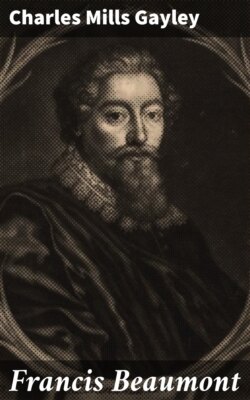Читать книгу Francis Beaumont - Charles Mills Gayley - Страница 18
На сайте Литреса книга снята с продажи.
CHAPTER VII
ОглавлениеTable of Contents
THE "BANKE-SIDE" AND THE PERIOD OF THE PARTNERSHIP
As we shall presently see, Beaumont during his career in London retained his connection with the Inner Temple, which would be his club; and it may be presumed that up to 1606 or 1607, his residence alternated between the Temple and his brother's home of Grace-Dieu. About 1609, however, he was surely collaborating with his friend, Fletcher, in the composition of plays. And we may conjecture that, in that or the previous year, our Castor and Pollux were established in those historic lodgings in Southwark where, as Aubrey, writing more than half a century later, tells us, they lived in closest intimacy. That gossipy chronicler records the obvious in his "there was a wonderfull consimility of phansey between him [Beaumont] and Mr. Jo. Fletcher, which caused that dearnesse of friendship between them";[63] but when he proceeds "They lived together on the Banke-side, not far from the Play-house, both batchelors; lay together (from Sir James Hales, etc.); had one wench in the house between them, which they did so admire, the same cloaths and cloake, etc., between them," we feel that so far as inferences are concerned the account is to be taken with at least a morsel of reserve. Aubrey was not born till after both Beaumont and Fletcher were dead; and, as Dyce pertinently remarks, "perhaps Aubrey's informant (Sir James Hales) knowing his ready credulity, purposely overcharged the picture of our poets' domestic establishment." To inquire too closely into gossip were folly; but it is only fair to recall that sixty years after Fletcher's death, popular tradition was content with conferring the "wench," exclusively upon him. Oldwit, in Shadwell's play of Bury-Fair (1689) says: "I myself, simple as I stand here, was a wit in the last age. I was created Ben Jonson's son, in the Apollo. I knew Fletcher, my friend Fletcher, and his maid Joan; well, I shall never forget him: I have supped with him at his house on the Banke-side; he loved a fat loin of pork of all things in the world; and Joan his maid had her beer-glass of sack; and we all kissed her, i' faith, and were as merry as passed."[64] It is hardly necessary, in any case, to surmise with those who sniff up improprieties that the admirable services of the original "wench," whether Joan or another, far exceeded the roasting of pork and the burning of sack for her two "batchelors."
To the years 1609 and 1610 may be assigned with some show of confidence Beaumont and Fletcher's first significant romantic dramas The Coxcombe and Philaster. The former was acted by the Children of her Majesty's Revels, I think before July 12, 1610. If at Blackfriars, before January 4, 1610; if at Whitefriars, after January 4. There are grounds for believing that it was the play upon which Fletcher and Beaumont were engaged in the country when Beaumont wrote a letter, justly famous, probably toward the end of 1609, to Ben Jonson; and, since the play was not well received, that it was one of the unsuccessful comedies which as Dryden says preceded Philaster. Philaster was acted at the Globe and Blackfriars by the King's Men, for the first time, it would appear, between December 7, 1609 and July 12, 1610. My reasons in detail for thus dating both of these dramas are given later. But a word about the Letter to Ben Jonson may be said here.
